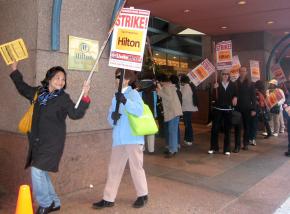No hospitality from the Hilton
, a delegate to the San Francisco Labor Council, reports on the latest three-day strike by UNITE HERE Local 2, this time against the Hilton.
SOME 850 hotel workers in San Francisco have hit the bricks again--this time for a three-day strike against the Hilton, the city's largest hotel. Picketing began early at 4 a.m. on April 7.
This is the fourth short-term strike against a city hotel since November. In fact, it was only a few months ago when more than 1,000 demonstrators marched around this same hotel to support 140 peaceful protesters who were arrested for blocking the main entrance.
Contracts expired in August 2009 for 9,000 UNITE HERE Local 2 members who are employed at 61 union venues. Since then, there has been a steady and consistent street presence by union members, who have vowed to keep up the pressure as long as it takes.
Workers know they are up against an influential and powerful group of owners who want to increase workloads and cut wages, benefits and pensions. Local 2 members are accustomed to long and protracted contract disputes. The 53-day strike/lockout and two-year boycott campaign from 2004-2006 is still very fresh in their memory. It ended in complete victory, but only after a prolonged battle.

The majority of these workers average $30,000 to $35,000 a year. It's hard to argue that this is an extravagant amount. But union workers do enjoy excellent medical benefits. Hilton employees, for example, pay $10 a month for family coverage. In these desperate times, this is worth fighting to maintain, and the membership remains firmly united.
The union has made a number of offers, some of which ask for only modest wage increases while preserving benefits. But Hilton management has consistently rejected all offers, including Local 2's minimum one-year proposal which would cost just $550,000 this year or around a 1.5 percent above current labor costs.
"We've been negotiating since August 2009," said 20-year veteran Hilton doorman Jacov Awoke, while holding his picket sign, "and we've gotten nowhere. Even though they're making profits, they don't want to pay us. We think this is the only way to get their attention--strikes, boycotts, sieges, whatever. Maybe when they start losing money, they will sign a decent contract."
Local 2 estimates their boycott against five union hotels has already resulted in $7 million in lost revenue being shifted to other locations.
THE HILTON is owned by a group of investors, the Blackstone Group, who aren't shy about throwing big parties and spending lavishly. In 2007, Reuters reported that their CEO, Stephen Schwarzman, spent $3 million on his 60th birthday--six times what a one-year contract covering 850 Hilton workers would cost.
But this was nothing compared to the celebration he must have had the next year. Schwarzman received over $1 billion in 2008 compensation after cashing in some of his stock. Since income from these investments will keep rolling in for the next several years, he will likely remain at the top of the CEO compensation heap for several years to come.
But it isn't only personal wealth that stands out as grotesque symbols of selfish greed. The tourist business as a whole has weathered economic storms better than most other industries. Even while bookings have decreased, according to Local 2, major hotels have continued generating substantial operating profits--in large part because of aggressive cost-cutting measures, including increased workloads.
Industry analysts believe that hotel revenues began increasing during the first quarter of 2010, and are expecting substantial increases in revenue during each of the coming years." In fact, data from PKF Hospitality Research suggests increased revenue for San Francisco major hotels of 12 percent in 2011 and 13 percent in 2012.
It seems the boom has already begun to hit the Hilton. According to Awoke, "the guest rooms are full and the ballrooms are all booked, so much so that lunches, dinners and banquets are being set up in the main lobby."
It appears obvious to union members that hotel owners want concessions whether in good times or bad times, and their arrogance of power doesn't go unnoticed. Two prominent ministers recently responded to the bargaining stalemate by writing an article in the San Francisco Chronicle that noted, "Hotels seem to be seizing opportunity out of crisis--to squeeze working people harder and position themselves for even more outsize profits."
With a solid membership remaining strongly united and mobilized, Local 2 hopes a full package of community support, periodic strike disruptions, effective boycotts and regular street protests can shift the balance toward achieving another victory like the one in 2006.
"I don't know whether it will happen this year, or in 2011 or in 2012," said Local 2 President Mike Casey, "but it will happen." Veteran political observers in this city are betting on Local 2, a union that just doesn't give up.


